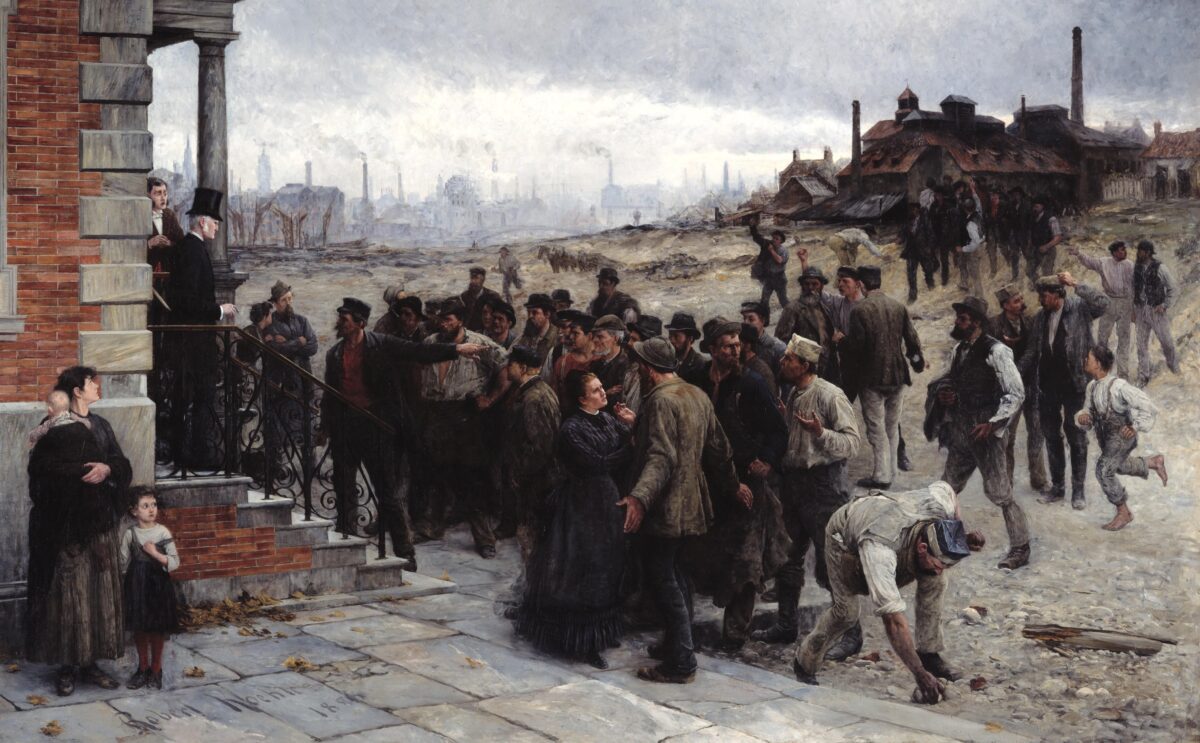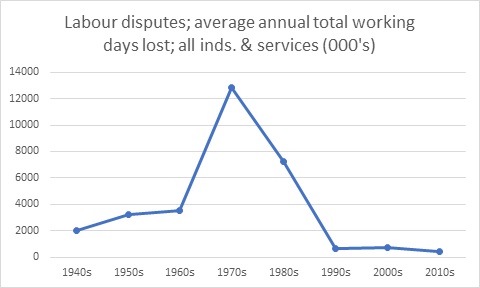Image Agitated workers face the factory owner in The Strike, painted by Robert Koehler in 1886. Source:Deutsches Historisches Museum: info pic
By Mike Swadling
“after two years of having our freedoms suspended not least our right to assemble, and with further threats to our rights to free speech coming along, it’s more important than ever to support the rights of those striking”
Over the past few weeks, we have seen industrial action or strikes hit the news again for the first time in a few years. The RMT has been holding a series of strikes on the railways, Arriva and Stagecoach workers have strike action planned. Despite Mayor Khan’s pledge to end London Underground strikes they are going ahead, and now teaching unions are threatening to ballot.
Strikes are never popular, but it does seem these are even less popular than most. Perhaps this is hardly surprising as we look forward to our first free summer for a couple of years, and with people worried about rising costs, these strikes could hardly come at a worse time. The government has come out strongly against them, as have many commentators, and it’s fair to say the zeitgeist generally has been against the strikes.
However, after two years of having our freedoms suspended not least our right to assemble, and with further threats to our rights to free speech coming along, it’s more important than ever to support the rights of those striking, even if you don’t support the reasons for the strikes and find some of the union barons unpleasant.
The craftsmen of the ancient Greeks formed loose associations. In the Roman Empire Collegia Opificum (unions of workers) included guilds of weavers, doctors, teachers, and painters. Guilds survived in the Eastern Roman or Byzantine Empire and then flourished across Europe in the later Middle Ages. The history of guilds working in the interest of their members and to maintain standards for goods is a long one.
As a result of the industrial revolution growing numbers of workers joined unions, fears of the French Revolution spreading to these shores, led to Combination Acts in 1799 and 1800, which outlawed “combining” or organising to gain better working conditions. In 1824 these were repealed, and Trade Unions became legal, but a new Combinations Act severely restricted their activities in 1825.
A century and a half of Parliament overreach in restricting the rights of workers to act collectively saw the formation of the Labour Party, the General Strike, and on the other side, years of union overreach with restrictive practice, closed shops, wildcat and nakedly political strikes. The 1980s saw an end to mass private sector union membership, and whilst the public sector has maintained large unionisation, as the chart below shows industrial disputes are at their lowest numbers in decades.
“As someone who campaigned for Brexit in part to allow us to reverse the 20 years of stagnant working-class wages, I don’t want to complain when workers collectively bargain to get a pay increase”
As someone who campaigned for Brexit in part to allow us to reverse the 20 years of stagnant working-class wages, I don’t want to complain when workers collectively bargain to get a pay increase. We all know inflation is a massive issue right now, and public sector workers getting bumper pay increases will make that situation worse not better, however that doesn’t negate the right of unions to strike for better pay.
Mis and contradictory information abounds on the train strike, with train drivers paid an average of £59,000 but the strikers average being reportedly a more modest £33,000. The strike is also about redundancies. It seems to me reasonable that with passenger numbers not recovering from lockdown, staff numbers are reduced, but it’s also reasonable for unions to fight for their members.
“2 years of intermittent lockdown and school closures, often egged on by teaching unions, may find the public unsympathetic to demands for pay rises many if not most in the private sector are not getting themselves”
Teachers and health care workers are now threatening strike ballots over pay. These strikes could possibly illicit even less public sympathy than those on the railway. As many who have tried to book appointments with their GP will know, we now have an NHS that seems reluctant to actually see patients. 2 years of intermittent lockdown and school closures, often egged on by teaching unions, may find the public unsympathetic to demands for pay rises many if not most in the private sector are not getting themselves. As is often the case, in the long term these strikes may hurt rather than help members.
Strikes provide one other important balance, with low unemployment and high worker mobility, strikes provide a release mechanism. They point to a failure in relations and allow people to act without leaving their role or industry.
Libertarianism.org describes libertarian views on Labor Unions (in the US context) as “The libertarian principle on which the legitimacy of labor unions depends is freedom of association”. It goes on to say due to the National Labor Relations Act (NLRA) “forbids workers individually to choose whether a union represents them in bargaining with employers about terms and conditions of employment. Instead, a union is granted monopoly bargaining privileges”, as such it considers much union activity in the US largely illegitimate.
Closed shops are illegal in the UK, although arguably de facto closed shops (97% of teachers, and 96% of train drivers are in a union) do exist. People do have a choice, it is much more common for people to change careers, and many sectors have large casual or agency working which often pays a premium in exchange for reduced benefits and security.
After a few years of repressed democracy and freedom, as someone who believes in an individual’s liberty, I can’t think of a more important time to stand up for the rights of people, who I disagree with, who’s politics I may dislike, to combine and peacefully associate, as they see fit.
This article also appeared in Blacklist Press’ Free Speech for 1st August 2022.


